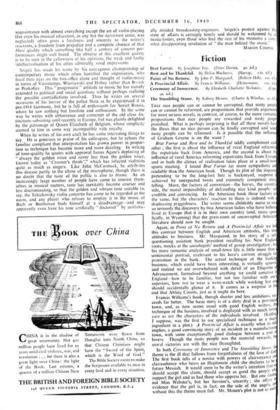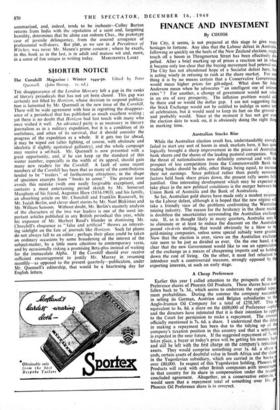Fiction
A Provincial Affair. By Francis Williams. (Heinemann. tos. 6a.
Ceremony of Innocence. By Elizabeth Charlotte Webster. ((•,r 93. 6d.) THAT nice people can or cannot be corrupted, that nasty peopl can or cannot be reformed, are propositions that provide argument for most serious novels, in contrast, of course, to the more rornanti propositions that nice people are rewarded and nasty peopl• punished. What is perhaps surprising is that all these novels har• the thesis that no nice person can be finally corrupted and nasty people can be reformed. Is it possible that the influe of Graham Greene is on the wane ?
Brat Farrar and Rest and be Thankful oddly complement ea other ; the first is about the influence of rural England reformin the expatriate back from America, and the second is about th• influence of rural America reforming expatriates back from Euro and in both the climax of realisation takes place at a small-tow, sports meeting. I found Brat Farrar far more sympathetic a readable than the American book. Though its plot of the impost• pretending to be the long-lost heir is hackneyed, suspense achieved by unexpected twists and extremely competent stop telling. More, the factors of conversion—the horses, the country side, the moral impossibility of defrauding nice kind people—ar credible and convincing. In the American book these factors at the same, but the characters' reaction to them is imbued with displeasing priggishness. The writer seems childishly naive to tat so seriously the discovery by two American ladies who have hithert lived in Europe that it is in their own country (and, more s. fically, in Wyoming) that the grass-roots of uncorrupted America literature should now be sought.
Again, in Point of No Return and A Provincial Affair we fir this contrast between English and American attitudes, this ti attitudes to business. Mr. Marquand, in his story of a self questioning assistant bank president recalling his New Engla roots, mocks at the sociologists' method of group investigation ; bu his more romantic analysis of small-town life is little more than sentimental portrait, irrelevant to his hero's current struggle fo promotion in the bank. The actual technique of the bankin business, which could have been interesting, is virtually igno and instead we are overwhelmed with detail of an Etiquette o Advancement. formalised beyond anything we could conceive England—how to be familiar, but not too familiar with one superiors, how not to wear a wrist-watch while working lest should accidentally glance at it. It comes as a surprise at I end that Abliity Counts, just as it might do here. Francis Williams's book, though shorter and less ambitious. sac ceeds far better. The basic story is of a dirty deal in a provinci town, and, as now seems usual with good English writers, t technique of the business involved is displayed with as much lovi care as are the characters of the individuals involved. (Kipli I suppose, was the first to use specialised technique as a ma ingredient in a plot.) A Provincial Affair is exactly what its ot implies, a good convincing story of an incident in a manufacturia town, with some exceptionally good dialogue between a pair 0 lovers. Though the nasty people win the material rewards. ill moral victories are with the nice throughout.
In both Ceremony of Innocence and The Stumbling Stone. theme is the ill that follows from forgetfulness of the love of (i The first book tells of a novice with powers of clairvoyance a clairaudience who bears an illegitimate child she declares to be future Messiah. It would seem to be the writer's intention that should accept this claim, should accept as good the people u support the girl and as bad those who oppress her. But one doub not Miss Webster's, but her heroine's, sincerity ; she offers evidence that the girl is, in fact, on the side of the angels, without this the theme must fail. Mr. Menen's plot is not so eas' summarised, and, indeed, tends to be inchoate—Colley Burton returns from India with the reputation of a saint and, forgetting humility, determines that he alone can redeem Chas., the prototype case of juvenile delinquency, from the assured arrogance of professional well-doers. But plot, as we saw in A Prevalence of Witches, was never Mr. Menen's prime concern ; where he excels, in this book as in the last, is in adult and mature wit and, more,
in a sense of fun unique in writing today. MARGHANITA LASKI



































 Previous page
Previous page